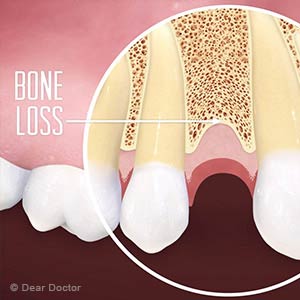Introduced to the United States in the 1980s, dental implants have quickly become the go-to restoration for tooth replacement. And for good reason: they’re not only incredibly life-like, but they’re also highly durable with a 95% success rate.
But as desirable as they are, you may face a major obstacle getting one because of the condition of the bone at your implant site. To position the implant for best appearance and long-term durability, we must have at least 4-5 mm of bone available along the horizontal dimension. Unfortunately, that’s not always the case with tooth loss.
This is because bone, like other living tissue, has a growth cycle: Older cells die and dissolve (resorb) and newer cells develop in their place. The forces transmitted to the jaw from the action of chewing helps stimulate this resorption and replacement cycle and keep it on track. When a tooth is lost, however, so is this stimulus.
This may result in a slowdown in cell replacement, causing the eventual loss of bone. And it doesn’t take long for it to occur after tooth loss—you could lose a quarter of bone width in just the first year, leaving you without enough bone to support an implant. In some cases, it may be necessary to choose another kind of restoration other than implants.
But inadequate bone isn’t an automatic disqualifier for implants. It’s often possible to regenerate lost bone through a procedure known as bone augmentation, in which we insert a bone graft at the missing tooth site. The graft serves as a scaffold for new bone cells to grow upon, which over time may regenerate enough bone to support an implant.
Even if you’ve had a missing tooth for some time, implementing bone augmentation could reverse any loss you may have experienced. In fact, it’s a common practice among dentists to place a bone graft immediately after a tooth extraction to minimize bone loss, especially if there will be a time lag between extraction and implant surgery.
Bone augmentation could add extra time to the implant process. But if successful, it will make it possible for you to enjoy this popular dental restoration. This will help in preventing bone loss thanks to our dental implants.
If you would like more information on dental implant restoration, please contact us at (860) 889-6445.

